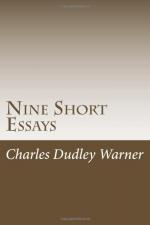The public garden of the Tuileries was closed at dusk, no one being permitted to remain in it after dark. I suppose it was not safe to trust the Parisians in the covert of its shades after nightfall, and no one could tell what foreign fanatics and assassins might do if they were permitted to pass the night so near the imperial residence. At any rate, everybody was drummed out before the twilight fairly began, and at the most fascinating hour for dreaming in the ancient garden. After sundown the great door of the Pavilion de l’Horloge swung open and there issued from it a drum-corps, which marched across the private garden and down the broad allee of the public garden, drumming as if the judgment-day were at hand, straight to the great gate of the Place de la Concorde, and returning by a side allee, beating up every covert and filling all the air with clamor until it disappeared, still thumping, into the court of the palace; and all the square seemed to ache with the sound. Never was there such pounding since Thackeray’s old Pierre, who, “just to keep up his drumming, one day drummed down the Bastile”:
At midnight I beat the
tattoo,
And woke up the Pikemen
of Paris
To follow the bold Barbaroux.
On the waves of this drumming the people poured out from every gate of the garden, until the last loiterer passed and the gendarmes closed the portals for the night. Before the lamps were lighted along the Rue de Rivoli and in the great square of the Revolution, the garden was left to the silence of its statues and its thousand memories. I often used to wonder, as I looked through the iron railing at nightfall, what might go on there and whether historic shades might not flit about in the ghostly walks.
Late in the afternoon of the 18th of June, after a long walk through the galleries of the Louvre, and excessively weary, I sat down to rest on a secluded bench in the southern grove of the garden; hidden from view by the tree-trunks. Where I sat I could see the old men and children in that sunny flower-garden, La Petite Provence, and I could see the great fountain-basin facing the Porte du Pont-Tournant. I must have heard the evening drumming, which was the signal for me to quit the garden; for I suppose even the dead in Paris hear that and are sensitive to the throb of the glory-calling drum. But if I did hear it,—it was only like an echo of the past, and I did not heed it any more than Napoleon in his tomb at the Invalides heeds, through the drawn curtain, the chanting of the daily mass. Overcome with fatigue, I must have slept soundly.
When I awoke it was dark under the trees. I started up and went into the broad promenade. The garden was deserted; I could hear the plash of the fountains, but no other sound therein. Lights were gleaming from the windows of the Tuileries, lights blazed along the Rue de Rivoli, dotted the great Square, and glowed for miles up the Champs Elysees. There were the steady roar of wheels and the tramping of feet without, but within was the stillness of death.




